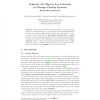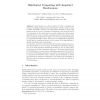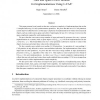WDAG
2005
Springer
15 years 7 months ago
2005
Springer
WDAG
2005
Springer
15 years 7 months ago
2005
Springer
Transactional Memory is a concurrent programming API in which concurrent threads synchronize via transactions (instead of locks). Although this model has mostly been studied in the...
WDAG
2005
Springer
15 years 7 months ago
2005
Springer
102
click to vote
WDAG
2005
Springer
15 years 7 months ago
2005
Springer
Abstract. The vast majority of papers on distributed computing assume that processes are assigned unique identifiers before computation begins. But is this assumption necessary? W...
WDAG
2005
Springer
15 years 7 months ago
2005
Springer
Abstract. In software transactional memory (STM) systems, a contention manager resolves conflicts among transactions accessing the same memory locations. Whereas atomicity and ser...
125
click to vote
WDAG
2005
Springer
15 years 7 months ago
2005
Springer
d Abstract) Carole Delporte-Gallet1 , Hugues Fauconnier2 , and Rachid Guerraoui3 1 ESIEE-IGM Marne-La-Vallee, France 2 LIAFA Univ Paris VII, France 3 EPFL Lausanne, Switzerland Thi...
WDAG
2005
Springer
15 years 7 months ago
2005
Springer
We introduce a new object, BH, and prove that a system with one BH object and single-writer Registers has the same computational power as a system with countably many commutative a...
WDAG
2005
Springer
15 years 7 months ago
2005
Springer
Randomness is a critical resource in many computational scenarios, enabling solutions where deterministic ones are elusive or even provably impossible. However, the randomized solu...
112
click to vote
WDAG
2005
Springer
15 years 7 months ago
2005
Springer
Atomicity (or linearizability) is a commonly used consistency criterion for distributed services and objects. Although atomic object implementations are abundant, proving that algo...
WDAG
2005
Springer
15 years 7 months ago
2005
Springer
This paper presents lower bounds on the time- and space-complexity of implementations that use the k compare-and-swap (k-CAS) synchronization primitives. We prove that the use of ...




